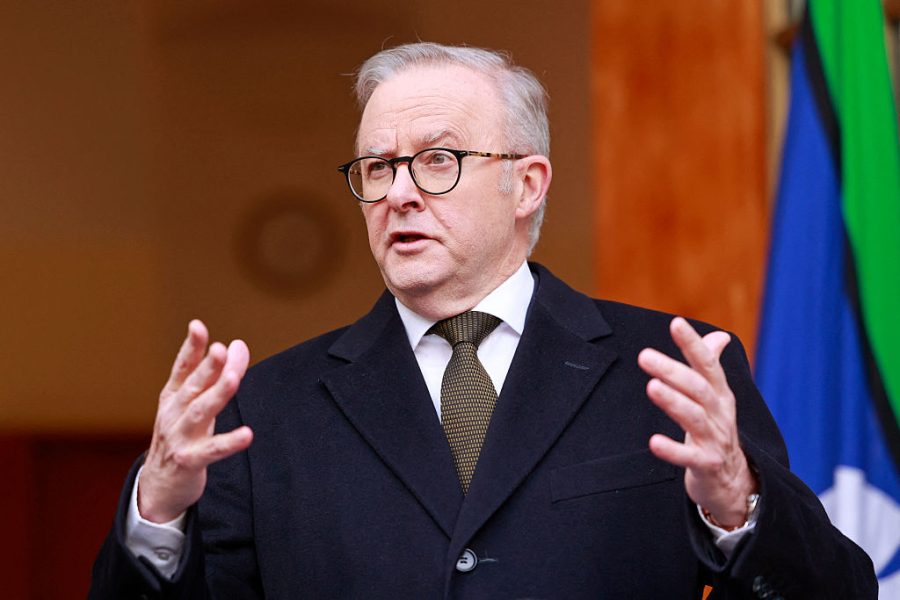When it comes to major decisions certain to anger Donald Trump and Israel’s prime minister, Benjamin Netanyahu, seeking safety in numbers is a wise idea. For that’s what the joint decision by Britain, Australia and Canada to recognise a state of Palestine actually is. It isn’t a bloc of Anglosphere nations showing a united front to Trump and Netanyahu; rather, it is their huddling together in an attempt to deflect the wrath of the Israelis and Americans.
Australian prime minister Anthony Albanese foreshadowed the possibility of Palestinian recognition several weeks ago, giving him something to announce today in New York as the UN General Assembly yet again deliberates on the Gaza conflict. His foreign minister, anti-Israel left-winger Penny Wong, made the running, effectively dragging Albanese with her, despite him saying as recently as a few months ago that his government had no plans to recognise the state. But, in concert with Keir Starmer and Canada’s Mark Carney, the deed is done.
The Australian prime minister’s decision was aimed squarely at the left wing of his own party
As in Britain, the Australian Labor government’s decision has polarised the country. Jewish groups are dismayed and angry. Senior Jewish leader Alex Ryvchin reflected the mood of his community when he said:
This has shown Hamas and [Iran], who carried out attacks on home soil here and rogue nations and terrorist forces around the world, that if you commit terrorism on a spectacular scale the world will run to the political outcome you seek.
Islamic communities, while maintaining passionate solidarity with their fellow Muslims in Gaza and empathising with their suffering, welcomed the decision. Some community leaders, however, denounced it as not going far enough. If they had their way, Israel would be isolated, trade links cut, and Israel’s leaders sanctioned. The Australian Federation of Islamic Councils said:
The decision to place conditions on the Palestinian people’s right to recognition…reinforces a patronising and unequal framework that continues to treat Palestinians as subjects to be managed rather than a people to be respected. The right to self-determination is not negotiable and cannot be contingent on what is deemed politically convenient or palatable by those who have historically enabled their oppression.
Those conditions include insisting that Hamas can never be part of a Palestinian government, despite the terror group’s murderous and barbaric rampage almost two years ago; its refusal to give up its remaining Israeli hostages; and its perpetrating brutal machine gun ‘justice’ of the sort posted to social media this week. Yet here we are.
But Islamic community leaders are not Albanese’s intended audience. Nor is it the mostly Israel-hostile UN member nations. Instead, the Australian prime minister’s decision was aimed squarely at the left wing of his own party, which has been uneasy, at best, with their government expressing any solidarity with Israel, even after 7 October. Albanese also was acutely mindful of the pressure of his MPs, especially those in a clutch of working-class constituencies in Sydney and Melbourne, with large Muslim minorities.
As in Britain, Australia’s conservative opposition was scornful of Albanese’s announcement. In terms echoing Kemi Badenoch’s scathing response to Keir Starmer, Sussan Ley wrote to 25 US congressional Republicans who had written to Albanese warning about the consequences for Israel and Gaza in recognising a Palestinian state now. She categorically rejected Albanese’s attempt to characterise recognition now as consistent with longstanding bipartisan support for the two-state solution and made it clear to the Americans that Albanese is going it alone. Australia’s conservative coalition would, she said, reverse the decision should it ever form government again. Separately, Ley also said:
The decision does not make the world a safer place, expedite the end of the conflict, deliver a two-state solution, see the free flow of aid, support the release of hostages nor put an end to the terrorist group Hamas. Unfortunately, the Albanese government has made it clear that they will still recognise a Palestinian state, regardless of whether or not their own conditions are met.
Just as he has to Britain and Canada, Netanyahu made his own anger clear to Albanese. ‘I have a clear message to those leaders who are recognising a Palestinian state after the horrendous October 7 massacre: You are rewarding terror with an enormous prize’, he declared.
But there is one unpredictable variable as this unfolds for Australia: Donald Trump. Unlike Starmer, who has developed an effective working relationship with the mercurial American president – highlighted by the success of Trump’s state visit to Britain last week – Albanese has never met Trump. Every opportunity for him to do so has either fallen through or been rebuffed by the Americans. Albanese’s failure to secure a one-on-one with Trump has become an ongoing political issue in Australia, especially with the Pentagon putting the Aukus strategic partnership under review. In stressing his anxiousness to get a meeting with the President, Albanese betrays how acutely conscious he is of how weak it makes him look as a national leader.
In light of what Albanese has announced, however, and especially given Trump’s staunch support of Netanyahu, a hoped-for sidelines meeting with the American president at the UN is looking extremely unlikely. Indeed, with the Australian government seemingly determined to put as much water as it can between itself and the Trump administration, why should the president bother?
Australia’s decision to recognise Palestine now is politically expedient for Albanese and his governing Labor party. But he, along with Starmer and Carney, is appeasing Hamas and rewarding terrorists for their barbarity. His is a decision that diminishes Australia but, with an opposition so impotent that he can act with impunity, Albanese will get away with it.







Comments